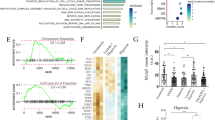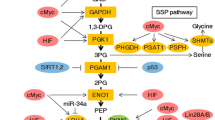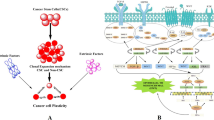We studied the mechanisms of adaptation of human breast cancer cells MCF-7 to hypoxia and analyzed the role of AMPK/mTOR signaling pathway in the maintenance of cell proliferation under hypoxic conditions. It was found that long-term culturing (30 days or more) of MCF-7 cells under hypoxic conditions induced their partial adaptation to hypoxia. Cell adaptation to hypoxia was associated with attenuation of hypoxia-dependent AMPK induction with simultaneous constitutive activation of mTOR and Akt. These findings suggest that these proteins can be promising targets for targeted therapy of tumors developing under hypoxic conditions.
Similar content being viewed by others
References
M. A. Krasil’nikov and N. V. Zhukov, Sovrem. Onkol., No. 2, 9-16 (2010).
M. A. Krasil’nikov and A. M. Shcherbakov, Uspekhi Mol. Onkol., 1, 18-26 (2014).
A. Alayev and M. K. Holz, J. Cell. Physiol., 228, No. 8, 1658-1664 (2013).
A. M. Arsham, J. J. Howell, and M. C. Simon, J. Biol. Chem., 278, No. 32, 29,655-29,660 (2003).
M. C. Brahimi-Horn and J. Pouyssegur, Int. Rev. Cytol., 242, 157-213 (2005)
E. Connolly, S. Braunstein, S. Formenti, and R. J. Schneider, Mol. Cell. Biol., 26, No. 10, 3955-3965 (2006).
M. P. DeYoung, P. Horak, A. Sofer, et al., Genes Dev., 22, No. 2, 239-251 (2008).
J. Folkman, Semin. Oncol., 29, No. 6, Suppl. 16, 15-18 (2002).
D. M. Gilkes and G. L. Semenza, Future Oncol. 9, No. 11, 1623-1636 (2009).
K. Inoki, T. Zhu, K. L. Guan, Cell, 115, No. 5, 577-590 (2003).
M. Iselt, W. Holtei, and P. Hilgard, Arzneimittelforschung, 39, No. 7, 747-749 (1989).
J. Kasznicki, A. Sliwinska, and J. Drzewoski, Ann. Transl. Med., 2, No. 6, 57 (2014).
J. S. Koo and W. Jung, Pathobiology, 77, No. 6, 289-300 (2010).
D. Liao and R. S. Johnson, Cancer Metastasis Rev., 26, No. 2, 281-290 (2007).
L. Liu, T.P. Cash, R. G. Jones, et al., Mol. Cell., 21, No. 4, 521-531 (2006).
Y. S. Lobanova, A. M. Scherbakov, V. A. Shatskaya, et al., Mol. Cell. Biochem., 324, Nos. 1-2, 65-71 (2009).
P. Malaguti, S. Vari, F. Cognetti, and A. Fabi, Anticancer Res., 33, No. 1, 21-28 (2013).
J. L. Merlin, S. Azzi, D. Lignon, et al., Eur. J. Cancer, 28A, Noы. 8-9, 1452-1458 (1992).
M. Milani and A. L. Harris, Eur. J. Cancer, 44, No. 18, 2766-2773 (2008).
J. Pouyssegur, F. Dayan, and N. M. Mazure, Nature, 441, 437-443 (2006).
J. Zhou, T. Schmid, S. Schnitzer, and B. Brune, Cancer Lett., 237, No. 1, 10-21 (2006).
Author information
Authors and Affiliations
Corresponding author
Additional information
Translated from Kletochnye Tekhnologii v Biologii i Meditsine, No. 4, pp. 246-251, October, 2015
Rights and permissions
About this article
Cite this article
Sorokin, D.V., Scherbakov, A.M., Yakushina, I.A. et al. The Mechanism of Adaptation of Breast Cancer Cells to Hypoxia: Role of AMPK/mTOR Signaling Pathway. Bull Exp Biol Med 160, 555–559 (2016). https://doi.org/10.1007/s10517-016-3217-5
Received:
Published:
Issue Date:
DOI: https://doi.org/10.1007/s10517-016-3217-5




